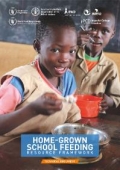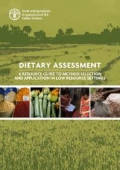
Capacity development
FAO is actively supporting regional and country capacities to shape food systems that enable healthy diets. Developing appropriate food systems policies and actions entails improving governments' and non-State actors' capacities for carrying out the necessary actions. To achieve this goal, FAO has developed a Capacity Development Roadmap in support of the revised Vision and Strategy for FAO's Work in Nutrition (FAO's Nutrition Strategy). The Roadmap will steer the capacity development activities by addressing current gaps and leveraging opportunities. To know more about the Capacity Development Roadmap and its implementation click here.
Main resources by thematic area
FAO has developed a series of technical papers, policy briefs, manuals, e-learning courses, webinars and videos to assist partners in the design and implementation of appropriate, informed and coherent food systems policies and actions.
Click on the thematic areas to know more about our capacity development resources and publications.
Resources

A global database, containing individual quantitative food consumption data from any country disregarding their level of income, made freely accessible online through an interactive web platform. FAO/WHO GIFT aims to be a...
31 October 2018

This brief describes what parliamentarians need to know about the current nutrition situation in the world and how our food systems are shaping food environments that steer people towards unhealthy diets which are one of the causal factors of malnutrition....
27 September 2018

This Resource framework is intended as a guidance tool for stakeholders involved in programme design, implementation and monitoring of Home-Grown School Feeding Programmes and the related policy and institutional environment, including, inter...
02 July 2018

This manual aims to signpost for the users the best way to measure food and nutrient intakes and to enhance their understanding of the key features, strengths and limitations of various methods. It also highlights a number of common methodological...







